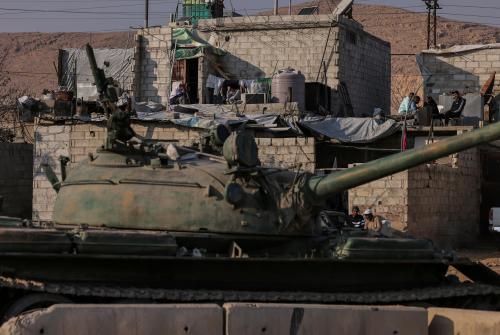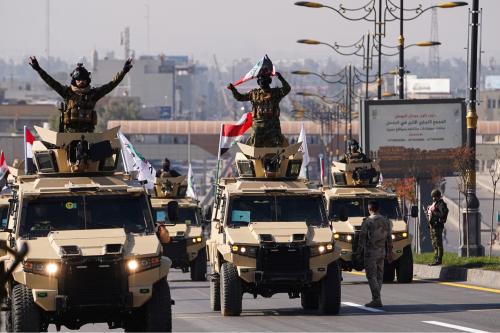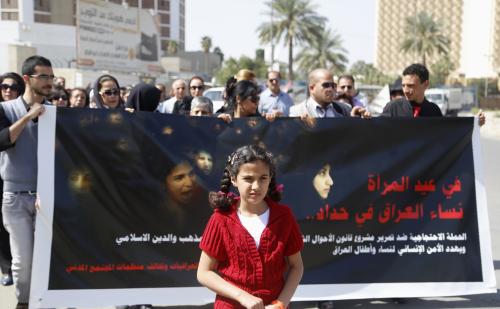In his Tuesday night speech, President Bush made a strong and sober case for sustaining the Iraq mission, asking the American people for their continued support and thanking the military for its ongoing sacrifice. But while requesting much of others, he did not do enough to uphold his end of the bargain: getting the policy right.
Any successful counterinsurgency requires progress on the security, economic and political fronts. Bush rightly spoke of impressive accomplishments in the last area, but he failed to acknowledge just how bad the security environment remains, and he barely spoke at all of Iraq’s economy.
Starting with security, the situation in Iraq is poor and not getting better. U.S. troop fatalities in both May and June exceeded the monthly average since the mission began. And for Iraqi security forces, these were the two bloodiest months since Saddam Hussein was deposed, with a total of more than 550 killed. Estimated crime rates are as bad as ever—and probably several times worse than in Hussein’s later years.
Foreign jihadists still appear to constitute no more than 10 percent of the total strength of the opposition, meaning that Iraqi insurgents remain nearly as numerous as ever (totaling perhaps 15,000). That said, jihadists have been growing in number, and their signature style of attack—the suicide bombing—claimed roughly 50 percent more victims in May and June than in any previous two-month period.
These trends suggest at least two policy initiatives. First, we must do everything within our power to help protect Iraqi security forces, beginning with provision of much better armor and with smarter security measures at places where recruits gather to apply for jobs. Second, in keeping with the recent ideas of Democratic Sens. Joe Biden of Delaware and John Kerry of Massachusetts, we should attempt to gain more allied assistance to protect Iraq’s borders. Since the jihadist threat is indeed serious, growing and a danger to all, there is a chance the allies would listen.
The economy is somewhat better than the security environment. Gross domestic product and average incomes now exceed prewar levels. There is a real bustle in the streets, and the fledgling stock market is thriving. The number of students in school is up about 20 percent since the early part of the decade. And some trappings of modern economic life, such as telephone service and Internet availability, have at least tripled since Hussein’s days.
But many other economic indicators are disappointing. Electricity has been a huge problem. The lights are on less than half the time in most cities. Average power production was below Baathist-era levels throughout almost all of last winter and spring, leaving well over 90 percent of Iraqis frustrated by the power situation and often inclined to blame the United States for it. The unemployment rate remains in the range of 30 to 40 percent, and, according to U.S. military surveys, more than 80 percent of Iraqis are discouraged by the overall state of the job market.
Just as the Great Depression of the 1930s created a special situation in the United States, circumstances in Iraq today put a premium on getting people back to work and putting money in their pockets. We need a massive jobs program. One worthy task, as Biden noted in a recent speech, would be to pay people to keep streets clean through simple, labor-intensive approaches (while large-scale sewage plants and trash pickup systems are gradually developed). Another might be to offer communities the means to construct their own backup power systems.
Finally, there is the realm of politics and public opinion. According to the latest surveys, more than 60 percent of Iraqis say their country is moving in the right direction, more than 70 percent expect life to get better for themselves in the future and 90 percent consider violence illegitimate for any political purpose. Most have confidence in the nascent Iraqi security forces and expect them to keep getting better. A large majority supports the newly elected government. Independent media are thriving. Citizen phone calls to hotlines informing authorities about the activities of insurgents are skyrocketing. Even among Sunni Arabs, polls indicate a gradually growing optimism.
But the generally favorable state of public opinion and politics is fragile. In particular, the United States must work harder to increase support from Sunni Arabs for the building of the new Iraq.
We can do at least two more things here. One would be to gently cajole the Kurds to protect the rights of Sunni Arabs around Kirkuk. If Kurds continue to try to push Sunni Arabs off this land and claim the oil below it for themselves, they risk creating a precedent that could lead to a Sunni Arab ghetto within Iraq, deprived of oil or much fertile farmland. It would be a long-term source of instability. Whoever gets the land, the oil revenue should be shared.
Most important, as James Steinberg and I have argued, the United States should announce a rough schedule for gradually downsizing its presence in Iraq over the next two years. This does not mean withdrawal; a smaller force might still number 30,000 to 40,000 troops, including rapid-reaction teams and American military advisers working with Iraqi units for years. But such a plan would counter the impression that we are occupiers—and counter the increasing worry among our troops that they will continue to spend half their lives in Iraq for the rest of the decade.
The Brookings Institution is committed to quality, independence, and impact.
We are supported by a diverse array of funders. In line with our values and policies, each Brookings publication represents the sole views of its author(s).



Commentary
Op-edWhat Bush Left Out: Security and Economic Policies in Iraq Need Repair
July 1, 2005